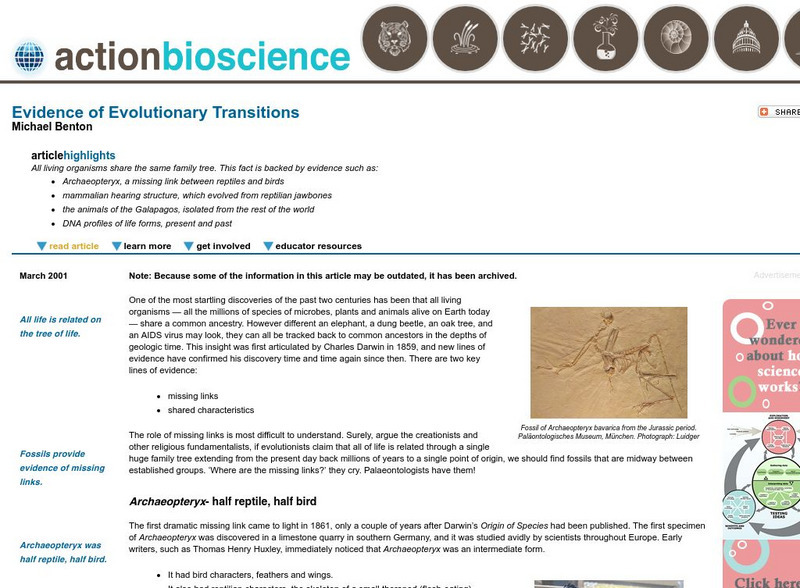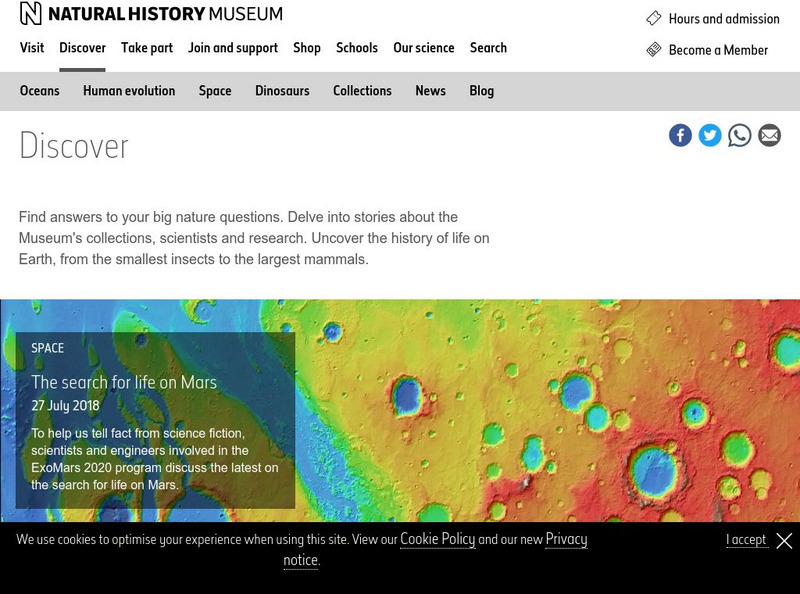Curated OER
Fossils
For this earth science worksheet, students use the clues given at the bottom of the sheet to solve the crossword puzzle on fossils. They identify specific names of fossils and how to make a mold of one.
Curated OER
Scientists Discover Giant Frog Fossil
Students examine a world map and read a news article about the discovery of a giant frog fossil. In this earth science and current event lesson, the teacher introduces an article with a discussion about continental drift and a vocabulary...
Curated OER
Dinosaur Traces
Students identify and interpret the type of evidence found at a typical dinosaur dig and mimic a paleontologist by taking crayon rubbings of simulated bone impressions. After the rubbings are taken, the students reconstruct the complete...
Curated OER
How Did Humans Evolve?
Students are introduced to four important fossil finds: the First Family, the Hadar Skull, Lucy, and the Laetoli Footprints. They explore how scientists interpret fossils to try to better comprehend how humans evolved. This activity...
Curated OER
Fossils
Fifth graders study the characteristics of fossils. They create a chart comparing the different fossil size, shape and texture. Students make observations and describe fossil characteristics in journals.
Curated OER
Vocabulary Words of the Southwest
A simple vocabulary definition worksheet has young geographers of the Southwest putting term meanings into their own words. The fifteen words include (but are not limited to) adobe, butte, canyon, economy, erode, fossil, and landform....
Curated OER
Frogs Frogs Frogs
Students view a disk on the continental movement and analyze the given data on fossils, rock types and climate zones. In this geology activity students draw a diagram of the earths layers, take a quiz complete a PowerPoint presentation.
Curated OER
The History of Life
For this Earth's history worksheet, students will complete 5 true or false questions based on the early history of the Earth. Students will match 7 fossil vocabulary words to their definitions. Students will complete 4 short answer...
Curated OER
Walking Whales
Eighth graders explore the theory of evolution of whales. For this walking whales lesson students study a reading packet, divide into groups and respond to given questions.
Curated OER
Fossil Evidence
Students evaluate each other's fossil imprints and they try to identify the original object. They comprehend the importance of accuracy in identifying a fossil imprint. Students create an answer sheet that has space for the names of the...
Curated OER
From Caterpillar to Butterfly
Students read and discuss the book about the butterfly and create their own butterflies using liquid watercolors and pipe cleaners. They then create a butterfly development book, included in the lesson, and color the pictures using...
Curated OER
Dino Dung!
Students examine how there is more to poop than they think! After reading through material, they answer a series of questions on coprolite, and explore the diet and physical attributes of dinosaurs, as well as their environment.
Curated OER
LESSON PLANS (print version) pdf What is a Fossil?
Young scholars can better explain how mould and cast fossils occur when they make their own cast fossils using plaster of Paris and objects such as shells, bone or even their own hand or footprint.
Children's Museum
The Children's Museum of Indianapolis: Mold and Cast
Students will define the term fossil, identify the difference between a mold and a cast fossil, and understand how scientists use models to learn about the physical structure of something in the natural world.
Georgia State University
Georgia State University: Hyper Physics: Fossil Distribution
One of the first lines of evidence suggesting the existence of plate tectonics was the discovery of very similar fossils in rock masses separated by vast distances and by ocean expanses. It suggested that those land areas had in the past...
American Institute of Biological Sciences
Action Bioscience: Evidence of Evolutionary Transitions
Charles Darwin's theory that all living organisms are connected in some way has been confirmed through intense studies over centuries. Understand the similarities that bond all things living to the same family tree by checking out this...
American Institute of Biological Sciences
Action Bioscience: Fossils and the Origin of Whales
Through fossils scientists have been able to study the evolution of whales. Read this article to take a closer look at the details.
Other
Carbon 14 Dating
Seven pages all about Carbon 14 Dating. Information on half-life, Carbon 14 used to date specimens and artifacts, limitations, charts and graphs. Michael E. Brown Ph.D. contests that the limitations of Carbon 14 dating support the theory...
Sophia Learning
Sophia: Geology: Crystals: Lesson 2
This lesson will present how to identify and classify crystals. It is 2 of 3 in the series titled "Geology: Crystals."
Annenberg Foundation
Annenberg Learner: Earth and Space Science: Every Rock Tells a Story
Explore the different types of rocks on our Earth as you watch a one-hour video, accompanied by learning goals, details on sedimentary rocks, fossils, and supercontinents, and more.
Natural History Museum
Natural History Museum: Types of Fossils
This particular site is part of a larger online exhibit from the Natural History Museum covering various aspects of fossils and fossil research. Here, seven types of fossils are listed and each type is given a picture representation.
Sophia Learning
Sophia: Geology: Crystals: Lesson 3
This lesson will present how to identify and classify crystals. It is 3 of 3 in the series titled "Geology: Crystals."
Sophia Learning
Sophia: Geology: Igneous Rocks: Lesson 2
This lesson will present how to identify and classify igneous rocks. It is 2 of 3 in the series titled "Geology: Igneous Rocks."
























